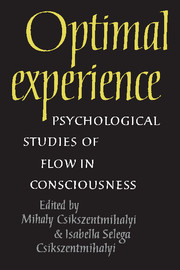Book contents
- Frontmatter
- Contents
- Acknowledgments
- Contributors
- I A THEORETICAL MODEL OF OPTIMAL EXPERIENCE
- 1 Introduction
- 2 The flow experience and its significance for human psychology
- 3 Sociological implications of the flow experience
- 4 Flow and biocultural evolution
- II VARIETIES OF THE FLOW EXPERIENCE
- III FLOW AS A WAY OF LIFE
- IV THE MEASUREMENT OF FLOW IN EVERYDAY LIFE
- References
- Name index
- Subject index
2 - The flow experience and its significance for human psychology
Published online by Cambridge University Press: 05 June 2012
- Frontmatter
- Contents
- Acknowledgments
- Contributors
- I A THEORETICAL MODEL OF OPTIMAL EXPERIENCE
- 1 Introduction
- 2 The flow experience and its significance for human psychology
- 3 Sociological implications of the flow experience
- 4 Flow and biocultural evolution
- II VARIETIES OF THE FLOW EXPERIENCE
- III FLOW AS A WAY OF LIFE
- IV THE MEASUREMENT OF FLOW IN EVERYDAY LIFE
- References
- Name index
- Subject index
Summary
In the ordinary course of events, psychologists observe human action either in clinical settings, where the “patient” is seeking therapeutic redress for some impairment, or in experimental settings, where the confines of the laboratory and the parameters of the experimental design allow only a tiny fraction of potential responses to be manifested. The theoretical models of human action that psychologists have constructed in the past half century reflect this poverty of observational data: They tend to be mechanistic, reductive, and biased in favor of pathology.
To provide a more complete view of what human behavior and experience entail, it is necessary to begin observing what people do and what happens to them when they are not confined to the couch or the laboratory, but are involved in their normal lives in real ecological settings. In particular, it is important to observe them in those moments when their lives reach peaks of involvement that produce intense feelings of enjoyment and creativity. Without accounting for these aspects of experience, models of human behavior will remain one-sided and incomplete. The studies of the flow experience included in this volume attempt to provide evidence on which a more realistic model of human behavior can be built.
The major psychological trends of this century – including drive theories, psychoanalysis, behaviorism, cognitive psychology, and the contemporary atheoretical neuropharmacological approaches – all share a common epistemology.
- Type
- Chapter
- Information
- Optimal ExperiencePsychological Studies of Flow in Consciousness, pp. 15 - 35Publisher: Cambridge University PressPrint publication year: 1988
- 422
- Cited by



